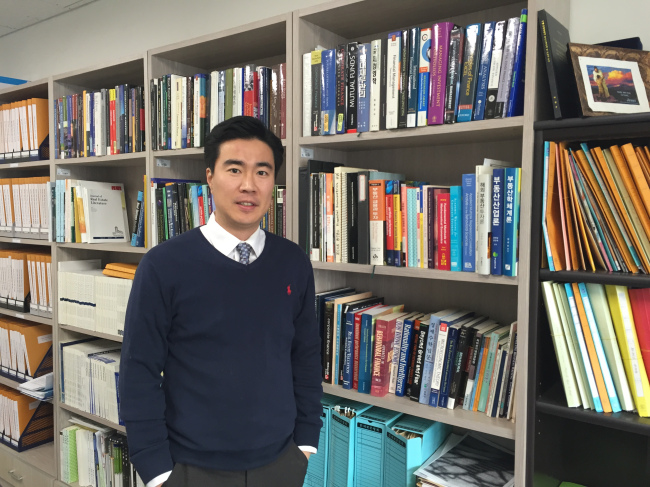[Herald Interview] ‘Korea needs new perceptions, tools for housing market’
By Park Hyung-kiPublished : Feb. 6, 2015 - 21:18
Korea needs to use the financial resources of the private sector and new, innovative tools to sustain the real estate market for long-term stability, according to Jin Chang-ha, a Hanyang University professor who specializes in real estate finance and investment.
The market is facing a paradigm shift, with “jeonse” leases ― lump sum deposits in lieu of rent ― quickly being replaced by rental agreements. In this situation, financial tools such as real estate investment trusts or funds via public-private partnerships can help narrow the gap between supply and demand.
The market is facing a paradigm shift, with “jeonse” leases ― lump sum deposits in lieu of rent ― quickly being replaced by rental agreements. In this situation, financial tools such as real estate investment trusts or funds via public-private partnerships can help narrow the gap between supply and demand.

In an interview with The Korea Herald, the economist, who is known for using theories of behavioural economics to find solutions to problems in the housing market, said Koreans also need to develop a new perception of the real estate market as it becomes more integrated with the capital market.
He added that the real estate market will no longer be viewed as a sector only for the low- and mid-income brackets, as properties will come to be recognized as financial investment assets, and demand for them will reflect socioeconomic changes such as the aging society, slow wage growth and low interest rates.
In addition to adopting new financial tools and resources, new mortgages that can help both landlords and potential buyers buffer losses against decreases in property value could change the general negative perception of the market. The following are excerpts from the interview.
KH: Can we say that Korea’s market paradigm has now shifted from jeonse to monthly rents?
JC: The choice between monthly rent and jeonse is likely to reflect the willingness of landlords rather than that of tenants. Landlords know switching from jeonse to monthly rent is more beneficial from an investment perspective. The main purpose of jeonse for landlords was driven by capital appreciation at the time of resale. Unfortunately, capital appreciation is no longer available due to the recent housing market slump. Most landlords now turn to stable rental income.
KH: How is the real estate market evolving?
JC: The integration of the housing rental market and capital market will accelerate, and the interest rate set by the Bank of Korea will directly impact the housing market. The determinant of monthly rents will be influenced by the so-called capitalization rate ― a relationship between property value and rental income, with the rate based on 10-year U.S. treasury bonds.
The capital market and the housing market will rapidly integrate if a systematic rental market is established. Over the long run, the real estate market will compete with other assets such as stocks, bonds and funds. As the current real estate market will be more closely integrated with asset markets, people will rebalance their wealth, expecting rental housing income to be part of their general financial assets.
KH: Do you believe supply-control measures were appropriate in times of skyrocketing jeonse prices?
JC: I would like to replace the term “supply-control” to “reexamination of the supply of residential housing.” The ratio of available national housing units to household units has exceeded 100 percent, meaning that the total supply and demand is about to match up. However, the problem mostly occurs in the mid- to low- income rental sector. Thus, I believe deregulation should target the low and mid-income households. In this sense, there should be benefits for first-time homebuyers and young households, deregulations in loan-to-value and debt-to-income ratios, as well as tax credits.
KH: What possible solutions can we come up with using behavior economics?
JC: Consider a situation in which you gain $1 million, or lose the same amount of money ― the situation will not provide you the same level of utility. The magnitude of utility you may feel when losing $1 million is a lot more painful than a situation in which you gain the same amount. This may explain why people are more concerned about the loss of home value than appreciation. If there is any possibility of losing their investment in the housing market, then people will overreact to the possibility of a loss situation. This is part of the Prospect Theory of Daniel Kahneman, a Nobel Prize-winner and professor at Princeton University. This behavioral theory can explain the behavior of many potential homebuyers who choose jeonse over buying a house, since the possibility of losing their home would be more painful than the gain situation. Thus, it is important to remove the possibility of losing their house value if they buy their property.
The creative adoption of this theory has led to the introduction of a new mortgage ― namely, a shared appreciation mortgage and shared loss mortgage. The new mortgage guarantees sharing a possible loss of a home decreasing in value and reducing the damage if it loses value.
KH: What are some of your recommendations based on other theories such as innovation economics for helping Korea stabilize the market?
JC: I would like to emphasize the role of real estate finance in the residential real estate market. To promote this paradigm shift, the government should consider possible financial recourses to stabilize the residential market. Residential real estate investment trusts have been recently introduced and launched. As a good example of an innovative financial tool, residential REITs would be a good investment for individual investors who expect a modest return and risk, and will be an appropriate funding source to sustain the rental-housing market.
By Park Hyong-ki (hkp@heraldcorp.com)






![[From the Scene] Monks, Buddhists hail return of remains of Buddhas](http://res.heraldm.com/phpwas/restmb_idxmake.php?idx=644&simg=/content/image/2024/04/19/20240419050617_0.jpg&u=20240419175937)








![[From the Scene] Monks, Buddhists hail return of remains of Buddhas](http://res.heraldm.com/phpwas/restmb_idxmake.php?idx=652&simg=/content/image/2024/04/19/20240419050617_0.jpg&u=20240419175937)

![[KH Explains] Hyundai's full hybrid edge to pay off amid slow transition to pure EVs](http://res.heraldm.com/phpwas/restmb_idxmake.php?idx=652&simg=/content/image/2024/04/18/20240418050645_0.jpg&u=20240419100350)

![[Today’s K-pop] Illit drops debut single remix](http://res.heraldm.com/phpwas/restmb_idxmake.php?idx=642&simg=/content/image/2024/04/19/20240419050612_0.jpg&u=)